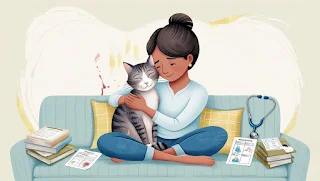Understanding Cat Throwing Up: What You Need to Know
When your cat starts throwing up, it can be a concerning and stressful experience for both you and your feline friend. Understanding the underlying reasons for this behavior is essential in providing the right care and ensuring your cat's well-being. In this section, we will delve into the various factors that can cause your cat to throw up and what you can do to address it.
Why Cats Vomit: Exploring the Common Triggers
Vomiting in cats can be triggered by a variety of factors, ranging from minor issues to more serious health concerns. Some common reasons why cats vomit include:
Dietary Indiscretion: Cats may vomit if they eat something they shouldn't, such as spoiled food, plants, or non-food items.
Hairballs: Cats groom themselves frequently, and the ingestion of hair can lead to the formation of hairballs, which can cause vomiting.
Food Sensitivities: Some cats have food allergies or intolerances that can lead to vomiting after eating certain ingredients.
Infections: Gastrointestinal infections caused by bacteria, viruses, or parasites can result in vomiting.
Chronic Conditions: Conditions such as kidney disease, liver disease, and pancreatitis can cause chronic vomiting in cats.
Understanding the specific cause of your cat's vomiting is crucial in determining the appropriate course of action.
Cat Upset Stomach: Recognizing the Signs
An upset stomach is a common issue that can lead to vomiting in cats. Some signs that your cat may have an upset stomach include:
Loss of Appetite: If your cat is not interested in eating, it could be a sign of an upset stomach.
Lethargy: A cat with an upset stomach may appear more tired or less active than usual.
Diarrhea: Along with vomiting, diarrhea can be a symptom of gastrointestinal distress.
Abdominal Pain: Your cat may exhibit signs of discomfort when you touch their abdomen.
If you notice any of these signs, it's important to monitor your cat closely and consult with your veterinarian if the symptoms persist.
Causes of Cat Vomiting: Identifying the Underlying Issues
Determining the cause of your cat's vomiting is essential in providing the right treatment. Some potential causes include:
Dietary Changes: Sudden changes in your cat's diet can lead to gastrointestinal upset and vomiting.
Toxins: Ingesting toxic substances, such as certain plants, chemicals, or medications, can cause vomiting.
Foreign Objects: Cats may swallow foreign objects, such as toys or string, which can lead to vomiting and other complications.
Stress: Stressful situations, such as moving or changes in the household, can trigger vomiting in some cats.
By identifying the specific cause of vomiting, you can take the necessary steps to address the issue and prevent future occurrences.
Feline Vomiting: When to Seek Veterinary Care
While occasional vomiting may not be a cause for concern, frequent or severe vomiting warrants a visit to the veterinarian. Some situations that require immediate veterinary attention include:
Persistent Vomiting: If your cat is vomiting repeatedly over a short period, it could indicate a serious issue.
Blood in Vomit: The presence of blood in the vomit is a sign of a potentially serious condition that needs prompt medical attention.
Dehydration: Vomiting can lead to dehydration, which can be life-threatening if not addressed.
Weight Loss: Significant weight loss in conjunction with vomiting is a red flag that requires veterinary evaluation.
It's always better to err on the side of caution and seek veterinary care if you have any concerns about your cat's health.
Vomiting in Cats: Prevention and Management Strategies
Preventing vomiting in cats involves addressing the underlying causes and implementing strategies to maintain their overall health. Some preventive measures include:
Regular Grooming: Regularly grooming your cat can help reduce the formation of hairballs, which can cause vomiting.
Proper Diet: Feeding your cat a balanced and appropriate diet can help prevent food-related vomiting. Avoid sudden changes in diet and introduce new foods gradually.
Environmental Enrichment: Providing a stimulating environment with plenty of toys and activities can help reduce stress-related vomiting.
Regular Veterinary Check-ups: Regular visits to the veterinarian can help identify and address any underlying health issues before they become serious.
By taking these steps, you can help ensure your cat's digestive health and overall well-being.
Cat Vomiting Medicine: Treatment Options
When it comes to treating vomiting in cats, your veterinarian may recommend various medications based on the underlying cause. Some common treatments include:
Antiemetics: These medications help reduce nausea and vomiting.
Probiotics: Probiotics can help restore the balance of good bacteria in the gut, which can improve digestive health.
Dietary Supplements: Supplements such as fiber or digestive enzymes may be recommended to support gastrointestinal function.
Prescription Diets: In some cases, a special prescription diet may be necessary to manage specific health conditions that cause vomiting.
Always follow your veterinarian's recommendations and never administer medications without professional guidance.
Cat Digestive Issues: Understanding and Addressing the Root Causes
Digestive issues are a common cause of vomiting in cats. Understanding the root causes and addressing them is key to managing your cat's health. Some common digestive issues include:
Inflammatory Bowel Disease (IBD): IBD is a chronic condition that causes inflammation in the gastrointestinal tract, leading to vomiting and other symptoms.
Food Allergies: Identifying and eliminating allergens from your cat's diet can help alleviate digestive issues.
Gastrointestinal Infections: Infections caused by bacteria, viruses, or parasites can disrupt the digestive system and cause vomiting.
By working with your veterinarian to identify and address the root causes of digestive issues, you can help improve your cat's quality of life.
In conclusion, understanding the causes and solutions for cat vomiting is essential in providing the best care for your feline friend. By recognizing the signs, seeking veterinary care when necessary, and implementing preventive measures, you can help ensure your cat's health and happiness.



